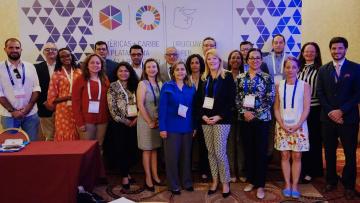As an integral part of the Regional Platform, a ministerial and high-level authorities meeting was held, the objective of which is to highlight the political commitment of the countries to disaster risk reduction (DRR) and to the results of the Regional Platform. . In addition, contributions from other important sectors are welcome, such as the private sector, youth, and others. Sponsored by the Government of the Oriental Republic of Uruguay as host country and with the cooperation of the United Nations Office for Disaster Risk Reduction (UNDRR), the VIII Regional Platform for Disaster Risk Reduction was held in the Americas and the Caribbean, in Punta del Este, Uruguay, from February 28 to March 2, 2023.
The VIII Regional Platform represents an opportunity for governments, intergovernmental organizations, the private sector, civil society, the scientific-technological community, cooperation agencies and donors, as well as other relevant actors in the Americas and the Caribbean, exchange experiences and facilitate decisions to promote the implementation of the Regional Action Plan (RAP) for the implementation of the Sendai Framework in the Americas and the Caribbean.
General objective:
Analyze the progress and obstacles to the implementation of the Sendai Framework and the PAR updated to 2021; seek proposals and collective responses to the challenges presented by the increase in the number and complexity of climate and disaster risks in the region; and in finding sustainable, attractive and valid mechanisms for the best use of science and technology in comprehensive disaster risk management.
Specific objectives:
1. Present and analyze the progress and obstacles at the national, subregional and regional levels in the comprehensive and inclusive implementation of the Sendai Framework, its goals and priorities, to identify good practices and recommendations that contribute to promoting its progress.
2. Examine compliance with the updated Regional Action Plan for 2021 and, in light of the growth in the number and complexity of climate and disaster risks, define regional priorities for the next two years 2023-2024.
3. Considering the systemic nature of the risk, recommend mechanisms and inclusive and sustained strategies for the best support, development and use of science and technology in GIRD.
Both in person and online, representatives of the Member States, intergovernmental organizations, the private sector, civil society, cooperation agencies, United Nations agencies, donors, development banks, the scientific and technological sector, academia and universities, financial institutions and planning, as well as other relevant actors in the Americas and the Caribbean.
The VIII Regional Platform represented an unparalleled opportunity for the Member States and all these actors to share experiences and good practices, have a greater impact on knowledge transfer and capacity development, and reaffirm their permanent commitment to disaster risk reduction through regional, national and local level.
ECLAC participated face-to-face in a parallel session (Room: Punta del Este A, B) and a learning laboratory (Room: Rio de Janeiro B) to promote the exchange of best practices, share learning through direct interaction that It covered important aspects for the implementation of the Sendai Framework priorities and the Regional Action Plan in the region for disaster risk reduction by multiple stakeholders from all sectors.
Programa
